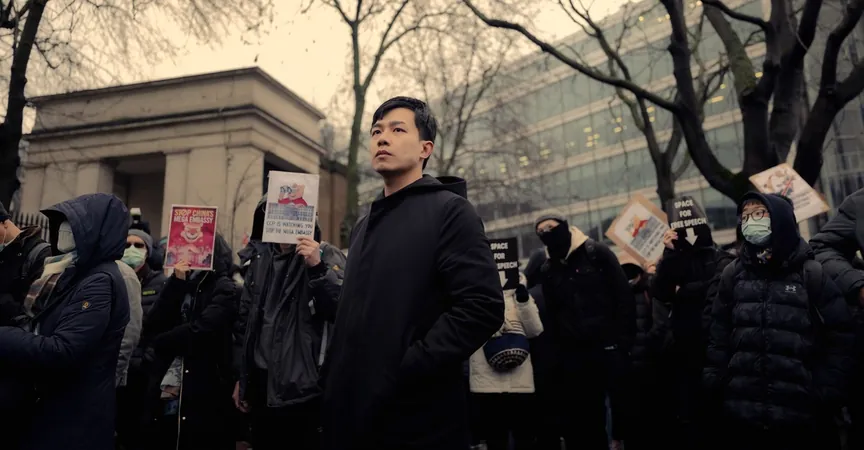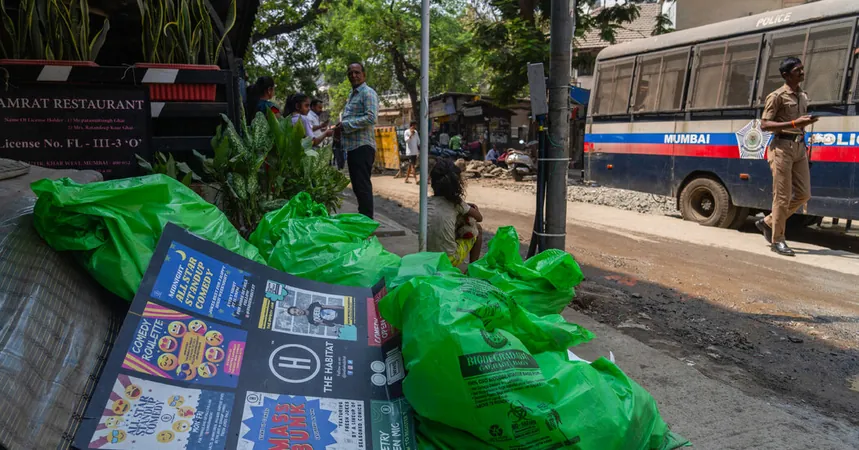
Fleeing Hong Kong Wasn't Enough: The Ongoing Struggle of Activists in Exile
2025-03-25
Author: Jessica Wong
The Struggle of Activists in Exile
Finn Lau believed he had left the oppressive grasp of the Chinese government behind when he arrived in London from Hong Kong. A former leader in the city's pro-democracy protests, Lau’s activism was abruptly halted when authorities arrested him during a demonstration in 2020. Seeking asylum, he hoped for safety, but fate had other plans. Shortly after relocating, he was brutally attacked by masked assailants in London, a violent encounter that left a scar on his face and an unnerving sense of vulnerability.
The British authorities classified the assault as a hate crime, but Lau felt the shadow of Beijing looming over him. Alarmingly, Chinese officials had announced a global manhunt for him, freezing his assets and putting a bounty on his head. The intimidation was relentless: Lau was confronted by fake journalists and online impersonators, relentlessly harassed with death threats; his family members in Hong Kong faced harassment as well, leading them to seek refuge outside of their homeland.
Lau is just one among thousands of Hong Kongers who fled to the UK after the Chinese government tightened its grip following the imposition of a national-security law in June 2020. This law has since justified the brutal suppression of dissent. I’ve spoken with over 30 activists who encountered similar harassment in the UK, where they thought they would find freedom but instead found themselves stalked and threatened. Incidents of intimidation have surged, with anonymous letters offering rewards for information on dissidents distributed in neighborhoods where exiles reside.
The Chinese government has transformed into a global harasser of dissidents, aiming to intimidate and silence critics worldwide. Recent reports from Freedom House illustrate that China has been the leading nation in documented incidents of suppression outside its borders over the past decade. As highlighted by experts, this coercive strategy seems to derive from the highest levels of power within the Chinese Communist Party (CCP) and is supported by Xi Jinping himself.
Despite evidence suggesting Beijing orchestrates these campaigns, Western governments remain largely powerless to prevent these violations of sovereignty. China’s audacious approach indicates a troubling confidence, perhaps fueled by fear of the growing dissident movement abroad.
The Role of the UK and the Hong Kong Diaspora
The UK is home to the largest Hong Kong diaspora globally, a population that poses an increasing threat to the CCP. Due to globalization and social media, dissidents can now mobilize support and foster political opposition from afar, making their voices even stronger. This fear prompted the Hong Kong government to escalate its crackdown on exiles. It has enacted laws that extend penalties to activists outside of its borders and sanctioned dissidents abroad, putting their safety at risk.
In 2023, a group in South London organized a camp aimed at educating young Hong Kong émigrés about the repression in their homeland. However, this initiative drew ire from Hong Kong officials, who publicly warned the organizers of potential repercussions from British and Hong Kong authorities.
Incidents of Violence and Intimidation
Reports of violence against Hong Kong activists have surfaced throughout the UK. In some instances, like the assault of a refugee at the Chinese consulate in Manchester, it’s apparent that the fear and reach of the Chinese state extend well beyond its borders. Recently, clashes ensued in places like Southampton, where Chinese students assaulted Hong Kong activists, fueled by the Chinese government's propaganda.
Simon Cheng, another prominent figure in the Hong Kong activism sphere, encountered harrowing experiences while working for the British consulate in Hong Kong. He endured mistreatment and captivity at the hands of Chinese officials before seeking asylum in the UK. Now an activist leading the Hong Kongers in Britain group, he faces constant threats from the Hong Kong government, which has targeted his family.
Chloe Cheung, a young activist who moved to Leeds with her family, shared how the threat of bounties on her life altered the course of her aspirations, causing severe anxiety about her safety and immediate future. She recounted terrifying encounters and public harassment, resulting in lost opportunities and a sense of isolation.
The Psychological Toll of Oppression
The psychological toll of such experiences is profound. One activist known as Alvin had to sever ties with friends and family to protect them from state reprisals. The emotional burden of knowing his loved ones faced scrutiny weighed heavily on him, leading to personal crises as he grappled with the implications of his activism.
Challenges for Western Governments and Activists
Despite calls from British lawmakers for more robust protections against Chinese interference, the challenge remains daunting. Reports of unauthorized Chinese operations aimed at surveilling and intimidating Hong Kongers have surfaced, emphasizing the urgent need for heightened vigilance against transnational repression.
As London battles with its diplomatic stance toward the CCP, activists remain on the front lines, protesting against a regime that seems ever more emboldened in its tactics. Recent demonstrations raised fears that a proposed new Chinese embassy would become a hub for surveillance and repression. Activists gathered in force to voice their concerns and express solidarity against these encroachments on their freedoms.
The Fight for Freedom and Justice
In their struggle, these activists are not just fighting for their own safety but for the voices of thousands who have faced the heavy hand of oppression. Their resilience embodies a broader movement against authoritarianism that extends beyond borders, uniting individuals in a cry for justice and freedom, even when far from home.





 Brasil (PT)
Brasil (PT)
 Canada (EN)
Canada (EN)
 Chile (ES)
Chile (ES)
 Česko (CS)
Česko (CS)
 대한민국 (KO)
대한민국 (KO)
 España (ES)
España (ES)
 France (FR)
France (FR)
 Hong Kong (EN)
Hong Kong (EN)
 Italia (IT)
Italia (IT)
 日本 (JA)
日本 (JA)
 Magyarország (HU)
Magyarország (HU)
 Norge (NO)
Norge (NO)
 Polska (PL)
Polska (PL)
 Schweiz (DE)
Schweiz (DE)
 Singapore (EN)
Singapore (EN)
 Sverige (SV)
Sverige (SV)
 Suomi (FI)
Suomi (FI)
 Türkiye (TR)
Türkiye (TR)
 الإمارات العربية المتحدة (AR)
الإمارات العربية المتحدة (AR)